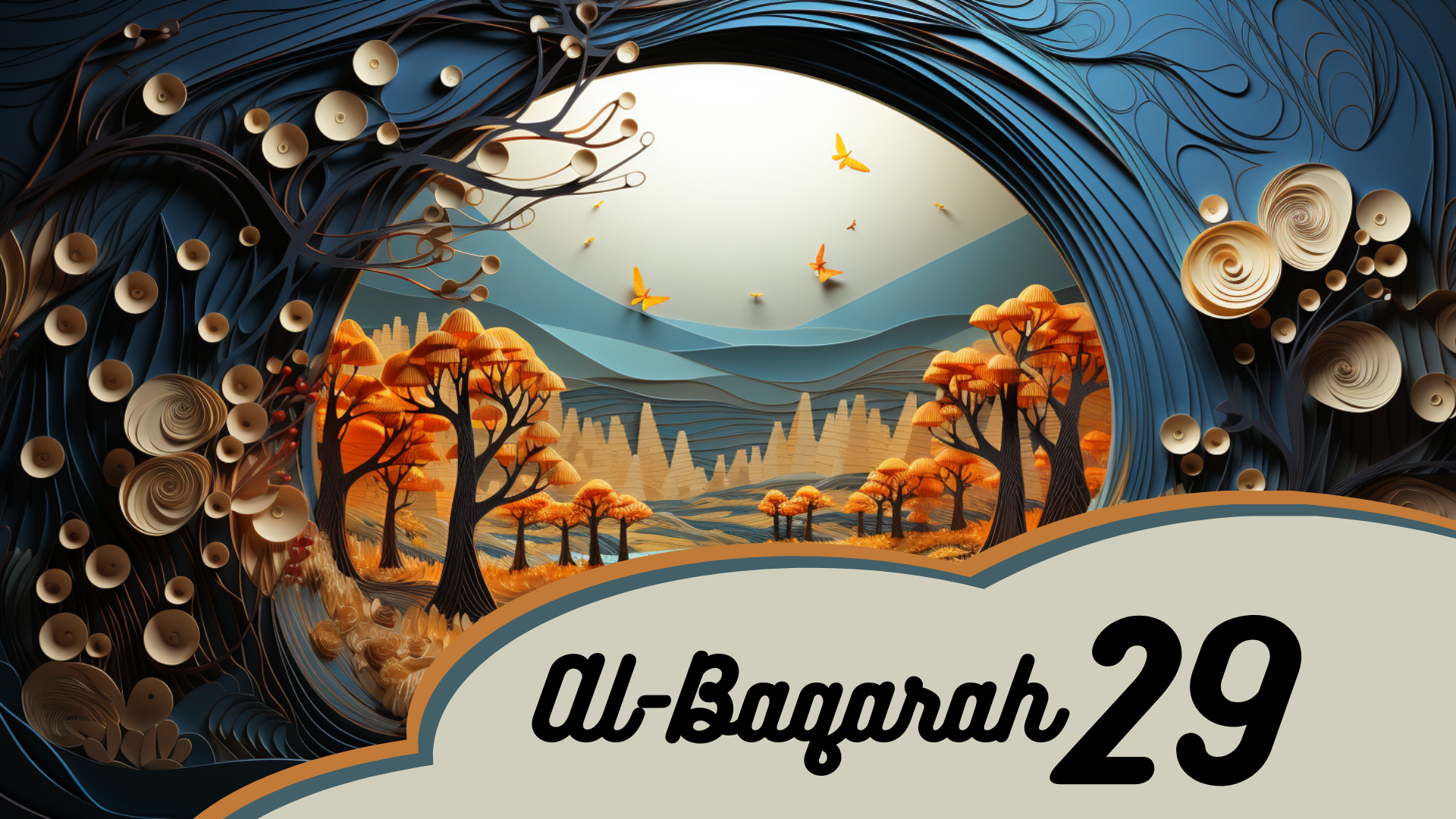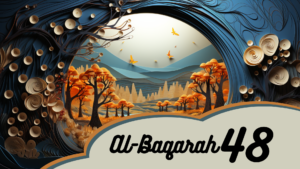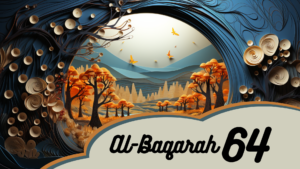In this article, we explore the profound meaning behind Verse 29 of Surah Al-Baqarah, a significant chapter in the Quran. Through a careful analysis, we uncover the layers of wisdom embedded within this verse, shedding light on its relevance to the daily lives of Muslims. By understanding the deeper meaning and applying its teachings, we can gain a greater appreciation for the guidance provided in Surah Al-Baqarah and its impact on our spiritual journey. Join us as we unravel the intricate insights from Verse 29 and discover its significance in the lives of believers.
Introduction
Surah Al-Baqarah is the second chapter of the Quran, and it holds immense importance in the lives of Muslims. This comprehensive chapter encompasses a wide range of themes and lessons, providing guidance for every aspect of life. In this article, we will delve into Verse 29 of Surah Al-Baqarah, exploring its translation, literal meaning, and interpretation. But before we do so, let us briefly touch upon the context of this remarkable surah.
Context of Surah Al-Baqarah
Revelation
Surah Al-Baqarah was revealed in Medina, after the migration of Prophet Muhammad (peace be upon him) from Mecca to Medina. It was revealed over a span of approximately nine years, making it one of the longest chapters in the Quran. The revelation of this surah took place at a time when the Muslim community was facing various challenges associated with establishing a new societal framework in Medina.
Placement in the Quran
Surah Al-Baqarah is situated after Surah Al-Fatiha, the opening chapter of the Quran. It serves as a continuation of the guidance provided in Surah Al-Fatiha, further elaborating on the principles and laws that should govern the lives of Muslims. With its diverse subject matters, Surah Al-Baqarah addresses not only the individual, but also the larger communal aspects of a Muslim’s life.
Summary of Surah Al-Baqarah
Surah Al-Baqarah covers a wide range of topics including the stories of the Prophets, the laws of Islam, guidance for personal conduct, and societal obligations. It begins with a discussion on the importance of faith, righteousness, and gratitude towards Allah. The surah then explores the stories of various prophets and their communities, drawing important lessons from their struggles and triumphs.
The chapter also outlines the basic principles of governance, such as the establishment of justice, the prohibition of usury, and the importance of charity. It emphasizes the significance of observing prayers, fasting, and performing pilgrimage. Furthermore, Surah Al-Baqarah elaborates on the moral and ethical guidelines that every Muslim should adhere to, promoting kindness, honesty, and the fulfillment of promises.
Understanding Verse 29 of Surah Al-Baqarah
Translation
The translation of Verse 29 of Surah Al-Baqarah is as follows: “It is He who created for you all that is in the earth, then He directed Himself to the heaven, so He made them complete seven heavens; and He is of everything all-knowing.”
Literal Meaning
This verse highlights the magnificence of Allah’s creation, emphasizing His ability to create and govern both the earth and the heavens. It signifies that everything we witness in the world around us is a manifestation of Allah’s power and knowledge.
Interpretation
The verse serves as a reminder for us to recognize and appreciate the blessings bestowed upon us by Allah. It reminds us that everything we have, from the air we breathe to the food we eat, is a gift from our Creator. We are urged to reflect upon the beauty and intricacy of the natural world, recognizing Allah’s omnipotence.
Moreover, this verse reminds us of our responsibility as stewards of the earth. It encourages us to care for the environment and all living beings, exercising responsible and sustainable practices. By acknowledging Allah as the Creator and sustainer of the universe, we are reminded of our duty to protect and preserve His creation.
Adam, the Vicegerent on Earth
Creation of Adam
One of the significant stories mentioned in Surah Al-Baqarah is the story of Adam, the first human being and the father of mankind. According to Islamic belief, Allah created Adam from clay and breathed into him the spirit of life. Adam was then placed on Earth as a vicegerent, entrusted with the responsibility of maintaining and cultivating this world.
Purpose of Creation
The story of Adam teaches us about the purpose of our existence on Earth. We, as human beings, have the ability to reason, make choices, and distinguish between right and wrong. Allah created us to worship Him, seek knowledge, and strive for righteousness. The story of Adam emphasizes the importance of using our faculties in the pursuit of good deeds and the fulfillment of our obligations towards Allah and His creation.
Authority and Responsibility
Duty of Human Beings
As vicegerents of Allah on Earth, we have been given authority over the natural world and its resources. However, this authority comes with a profound responsibility. We are entrusted with the task of utilizing these resources wisely, while ensuring sustainability and balance. This duty extends not only to the physical environment but also to our interactions with other human beings and all living creatures.
Stewardship
Islam emphasizes the concept of stewardship, urging mankind to be mindful of the impact of our actions on the environment and the well-being of others. Our responsibility as stewards requires us to treat the earth and its inhabitants with care, compassion, and respect. By acknowledging our role as stewards, we can strive towards a more harmonious and sustainable coexistence with all of Allah’s creation.
The Prohibited Tree
Location and Nature
Surah Al-Baqarah mentions the story of Adam and Eve’s temptation by the forbidden tree. They were placed in the paradise of Jannah, wherein they were granted unrestricted access to everything, except for one tree. Despite the abundance of all other provisions, Adam and Eve were tempted by the fruit of the prohibited tree.
Symbolism
The story of the prohibited tree serves as a reminder of the inherent vulnerability and propensity for temptation within every human being. It symbolizes the struggle between our desires and the boundaries set by Allah. The prohibition of the tree represents the need for self-discipline, obedience, and trust in Allah’s wisdom.
Satan’s Deception
Satan’s Promise
In Surah Al-Baqarah, Satan tricks Adam and Eve by promising them eternal life and kingship if they were to eat from the forbidden tree. Satan used deception and manipulation to exploit their desires and lead them astray.
Challenges to Adam and Eve
The story of Adam and Eve’s encounter with Satan highlights the perpetual battle between good and evil in human nature. It emphasizes the importance of recognizing and resisting the temptations placed before us, and remaining steadfast in our commitment to obeying Allah’s commandments. The story serves as a powerful reminder of the consequences that disobedience can bring.
Consequences of Disobedience
Loss of Paradise
As a result of Adam and Eve’s disobedience, they were expelled from the paradise of Jannah. This serves as a cautionary tale, illustrating the consequences of succumbing to temptation and disregarding Allah’s commandments. The loss of paradise symbolizes the separation from the blissful presence of Allah and the subsequent hardships that humans would face on Earth.
Awareness of Nakedness
Upon consuming the forbidden fruit, Adam and Eve became conscious of their nakedness and sought to cover themselves. This awareness signifies the loss of their innocence and purity. It illustrates how disobedience can lead to feelings of shame and distance from Allah’s mercy.
Conclusion
Surah Al-Baqarah is a profound chapter that delves into numerous significant themes and lessons. It provides guidance for various aspects of a Muslim’s life, offering insights into faith, governance, personal conduct, and societal obligations. Verse 29 of Surah Al-Baqarah emphasizes the omnipotence of Allah and our responsibility as stewards of His creation. The story of Adam and Eve serves as a reminder of the struggles and temptations we face as human beings, highlighting the importance of obedience, self-discipline, and trust in Allah’s wisdom. By reflecting upon the lessons conveyed in Surah Al-Baqarah, we can strive towards leading a righteous and fulfilling life in accordance with Allah’s guidance.




